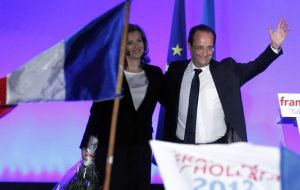MercoPress. South Atlantic News Agency
Hollande first scheduled meeting with Merkel in Berlin to address austerity and growth
 The elected French president celebrates with supporters at the Place de la Bastille
The elected French president celebrates with supporters at the Place de la Bastille A victorious Francois Hollande faces a short honeymoon after his election as France's first Socialist president in 17 years, with financial markets eager for clear signals on his policies and how hard he plans to push back against German-led austerity.
The moderate Socialist beat conservative Nicolas Sarkozy with 51.7% of Sunday's runoff vote after a bruising campaign dominated by the same anger over economic crisis that has felled 10 other European leaders since late 2009.
While jubilant left-wing voters partied into the early hours of Monday in central Paris, Hollande admitted that for him, the festivities would have to be short-lived.
“There is a lot of joy and pride but also apprehension at taking on this responsibility at a difficult time for the country and for Europe,” he said.
After delivering a victory speech in his rural base of Tulle in central France, he flew to Paris and addressed tens of thousands of supporters in historic Bastille square.
The new president is expected to be sworn in on May 15. As fears about the Euro zone's debt crisis resurface following an inconclusive election in Greece, Hollande will travel to Berlin shortly thereafter to challenge Germany's focus on austerity policies and press new ideas for stimulating growth.
“In every capital, beyond the heads of state and government, there are people who have found hope thanks to us, who are looking to us and want to put an end to austerity,” he declared.
The left reclaimed Bastille square where revellers danced the night away in 1981 when Francois Mitterrand became the Socialist Party's first directly elected president. Three decades later, a new generation of left-wing voters waved red flags and some carried roses, the party emblem.
Hollande is expected to include some trusted old hands in his government like Mitterrand's former PM Laurent Fabius but add many young politicians and women.
His economic team, led by centre-left former finance Minister Michel Sapin, includes politicians, industry leaders and public officials seen as market-friendly.
Hollande must quickly outline his domestic plans, likely to centre on a major tax reform, and revise over-optimistic growth targets which threaten France's deficit-cutting goals.
His plans to tweak a reform that raised the retirement age to 62 and increase the minimum wage are also rattling investors who fear France could drift away from the club of sound northern European borrowers and towards the debt-laden periphery.
Sarkozy, punished for his failure to rein in 10% unemployment and for his brash personal style, conceded defeat within 20 minutes of polls closing on Sunday, telling supporters he had wished Hollande good luck in such trying times.
“I bear the full responsibility for this defeat,” Sarkozy said, indicating he would withdraw from frontline politics.
Hollande's clear win should give the self-styled “Mr Normal” the momentum to press German Chancellor Angela Merkel to accept a policy shift towards fostering growth in Europe to balance the austerity that has fuelled anger across southern Europe.
Merkel, who had openly favoured fellow conservative Sarkozy, telephoned to congratulate Hollande and invited him to Berlin after his inauguration. The vote ended the “Merkozy” duo that led Europe through crisis and ushers in an untested partnership.
German Foreign Minister Guido Westerwelle said: “We will now work together on a growth pact for Europe that delivers more growth through more competitiveness.”
Opinion polls taken on Sunday showed the left strongly placed to win a majority in parliamentary elections next month, especially since the anti-immigration National Front is set to split the right-wing vote and hurt Sarkozy's UMP party.
If they win that two-round election on June 10 and 17, the Socialists would hold more levers of power than ever before, with the presidency, both houses of parliament, nearly all regions, and two-thirds of French towns in their hands.
Hollande led the presidential race from start to finish, outlining a comprehensive programme in January based on raising taxes, especially on high earners, to finance spending priorities and rein in the public deficit to zero by 2017.
He benefited from public distaste for the incumbent's abrasive style as well as anger about economic gloom that has swept aside leaders from Dublin to Lisbon.





Top Comments
Disclaimer & comment rules-

Read all commentsNicolas Sarkozy never did like this pompas fool,
May 07th, 2012 - 10:36 am 0ah but mr holland, good or bad, time will tell,
one thing is for sure,, he has laid down a challenge already to the germans,
will he do a david, or buckel under
mmmm
Commenting for this story is now closed.
If you have a Facebook account, become a fan and comment on our Facebook Page!